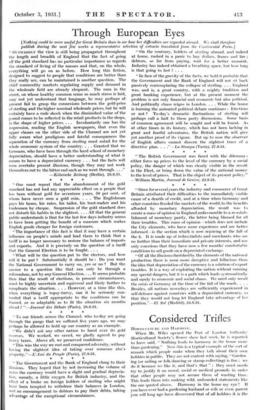"Since for several years the industry and commerce of Great
Britain attributed their difficulties to the immediately visible cause of a dearth of credit, and at a time when Germany and other countries flooded the markets of the world, to the benefits afforded by monetary depreciation, the result was to create a mass of opinion in England unfavourable to a re-estab-- lishment of monetary parity, the latter being blamed for all their troubles. This mass of opinion—which does not include the City elements, who have more experience and are better informed—is the section which is now rejoicing at the fall of the £. It is made up of industrialists and merchants who see no further than their immediate and private interests, and are only conscious that they have now a few months' comfortable conditions to sell goods on a depreciated exchange.
" Of all the illusions cherished by the elements of the national production there is none more deceptive and fallacious than the idea that depreciation of the currency is a solution of export troubles. It is a way of exploiting the nation without running any special dangers, but it is a path which leads systematically and surely to economic and social chaos. We need only recall the crisis of Germany at the time of the fall of the mark. . . . Besides, all nations nowadays. are sufficiently experienced in self-defence against countries with a depreciated currency, so that they would not long let England take advantage of her position.'—El Sol (Madrid), 24.9.31.










































 Previous page
Previous page